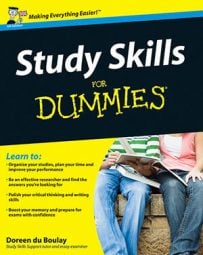A very exciting phase in your life is about to start – new teachers, new classmates and new things to study. If you’re away from home for the first time, you need to work out new strategies to get yourself up on time without the person (or pet) that used to perform that function.
You’ll discover, sadly, that the washing fairy who used to transform piles of discarded clothes into sweet-smelling, smoothly ironed wearable articles is a myth – or didn’t accompany you to your new address. You’ll learn a lot about yourself. You might turn out to be a highly talented omelette maker, write the best essay on fluoridisation and freedom in your study group or score a hat trick at hockey, a sport you never played at school.
Some things you can do nothing about, like not growing another six inches if it’s not in your genes. However, there are plenty of things you can improve by developing strategies and planning, and the good thing about planning is that it doesn’t take very long. You can do it in small doses, and it can make a big difference.
In addition, planning will save time so that you can have more fun, and some planning will itself be fun and certainly a lot more interesting than watching paint dry. Knowing how to do things – having good study skills – is just as important as knowing what’s what!
Here are some quick tips and tricks:
Keep a learning diary
Take useful breaks
Study in groups
Most courses these days aren’t assessed by exams alone: coursework forms a big component of the final grade. This means that you don’t have all your eggs in one basket, but it also usually means you have to achieve a minimum mark for assessed coursework and a minimum mark for the exam as well in order to pass.
For some exams, you may be given the questions in advance so that you can research the answers. However, it’s less stressful and more useful if you have a continuous review plan throughout the academic year to revise your knowledge and refresh your memory.
Some subjects – pure science, for example – are more information dense than others. Even so, at least 30 per cent of any subject is about what to do with information, rather than information itself, and this is reflected in exam questions.
Setting up more links to the information you already have empowers you by giving you more choices, and more potential outcomes for your knowledge in the exam.
Here are some time-saving techniques:
Ask direct questions
Plan to do things at the best time
Prioritize your workload
Don’t aim to be perfect
Avoid procrastination
Learn to say ‘NO’!
Find you a quiet place and time
Build in some flexibility
Use big blocks of time for big tasks and big plans for big projects
Revise reading lists

